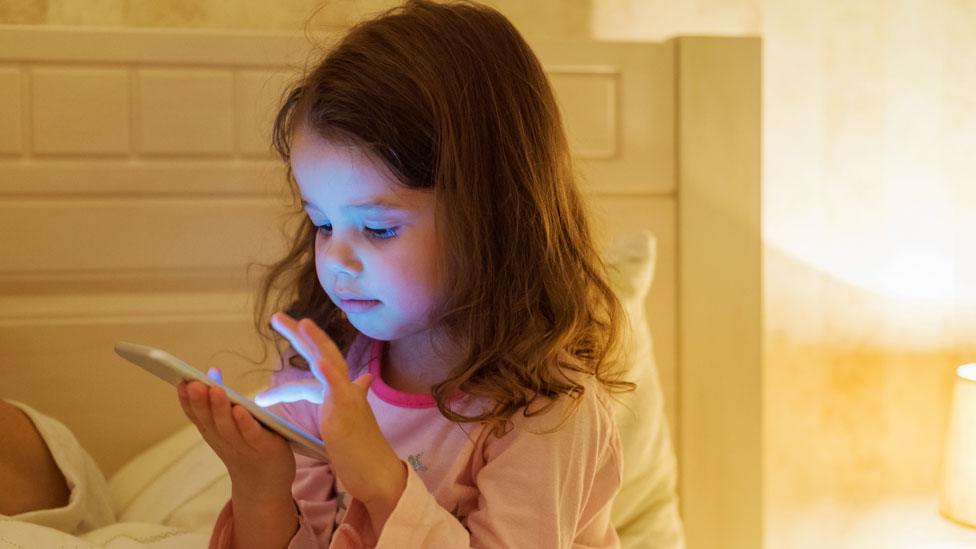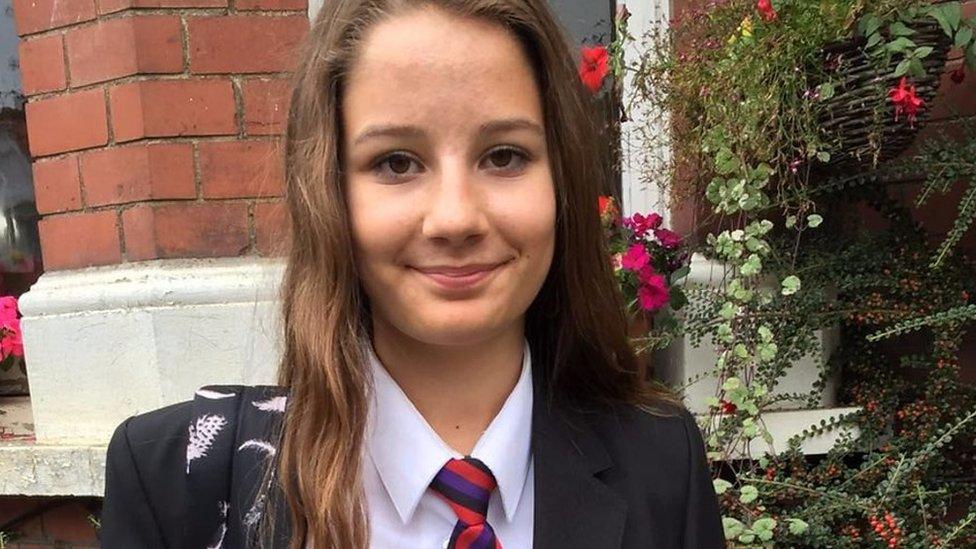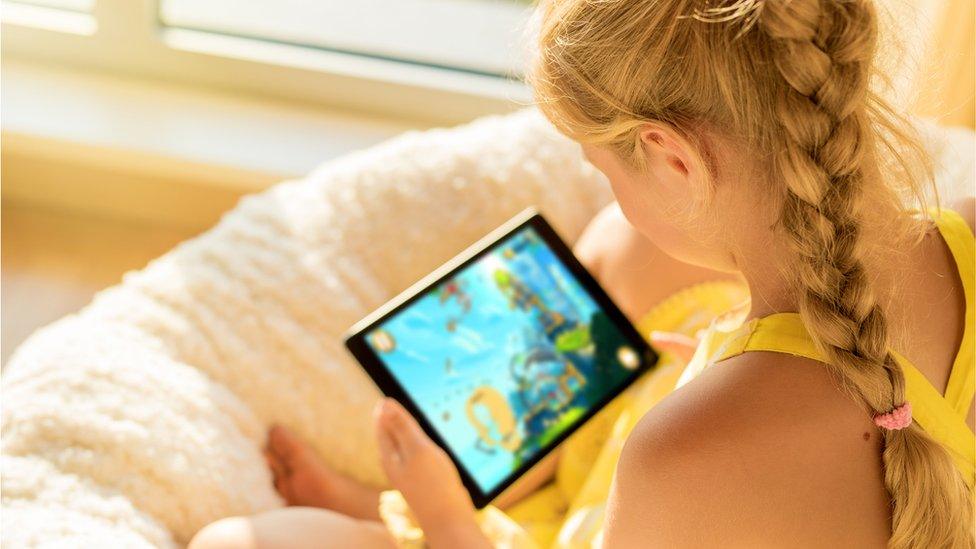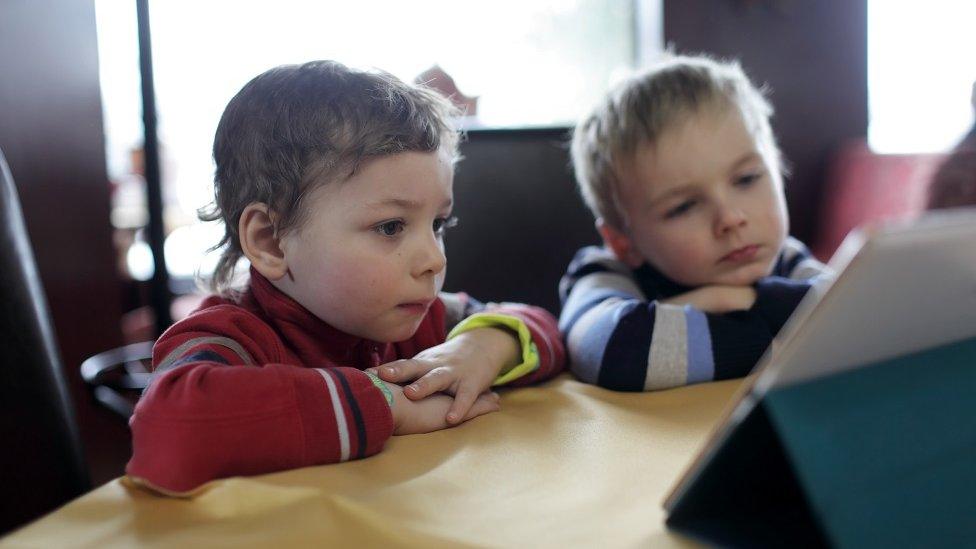Families advised to ban screens at bedtime
- Published
- comments

The government recommendation is to keep screens out of the bedroom at bedtime
Families should ban mobile phones from the dinner table and at bedtime, according to the UK's top doctors.
The guidance has been published by four chief medical officers, including Scotland's Dr Catherine Calderwood.
It also warns parents that they should never assume a child is happy to have their photo published online.
Meanwhile the Scottish government has announced it will produce its own guidance on the healthy use of social media and screen time for young people.
It comes after links were made between the suicide of teenager Molly Russell and her exposure to harmful material on Instagram.
Her father has said he believes the Facebook-owned platform "helped kill my daughter".
England's Health Secretary, Matt Hancock, is due to meet bosses at Instagram over the handling of self-harm and suicide content.

After Molly Russell took her own life, her family discovered distressing material about suicide on her Instagram account
The chief medical officers' advice forms part of a "precautionary approach" by officials, following an independent review of the effect of screen and social media use by children and young people.
They said there was insufficient evidence to recommend an optimal amount of time to spend online, but suggested parents set boundaries to ensure a healthy balance.
What does the guidance recommend parents do?
There are several clear steps for parents, which the CMOs say will help keep children safe and healthy.
These include:
Not using phones and mobile devices at the dinner table - talking as a family is very important for development
Keeping screens out of the bedroom at bedtime
Talking as a family about keeping safe online and about cyber-bulling and what children should do if they are worried
Not using phones when crossing a road or doing an activity that requires a person's full attention
Making sure children take a break from screens every two hours by getting up and being active
Policing their own use too - parents should give their children proper attention and quality family time and never assume they are happy for pictures to be shared
The chief medical officers have also called for action from technology companies, backing the establishment of an industry duty of care and a voluntary code of conduct.
Measures to protect children online could include introducing clearer terms of conditions, improving age verification, and sharing anonymised data for scientific research to help improve understanding of the effect of screen time on young people, they said.
'Parents paying attention'
"It is imperative that the technology industry proactively acts in the interests of users, as well as shareholders," the report by the medical officers of England, Scotland, Wales and Northern Ireland states.
Dr Calderwood told BBC radio's Good Morning Scotland programme that the guidance was not about an outright ban on screen time, but instead clinicians were responding to increasing pressure from parents and young people on the issue.

Doctors have seen a rise in rates of depression among children using screen time for longer
She added: "There's no evidence of causation of harm, but what we have seen is a rise in children's depression rate, in children saying that their quality of life is lower if they are using screen time for long periods of time.
"We know that children notice if their parents are paying attention to them and we do know that one in five children wakes up at night to check their phone for social media messages and interrupted sleep decreases their quality of education the next day.
"So there isn't a cause and effect, but there seems to be an association and that's why we've been very cautious in making very bold statements about the harms."
What about the internet companies?
The guidance was also welcomed by Facebook, which said it wanted to work with government and "wider society" to ensure young people can make the most of the internet while staying safe.
Twitter said it had made 70 changes in 2018 to make the platform "healthier and safer".

Some research included in the review, which was carried out by a team at University College London, has found a link between those who use screen-based activities more frequently and over longer periods and mental health problems.
But it is not possible to determine if screen time can cause these issues.
Shirley Cramer, chief executive of the Royal Society of Public Health, said: "Barely a day passes without yet more concerning findings regarding the potential harms around screen use or social media.
"This advice is therefore a step in the right direction towards the establishment of much needed clearer guidance which parents are crying out for to protect their children and help them navigate the Wild West of the digital world."
What are the Scottish government's plans?
New Scotland-specific advice on the healthy use of social media and screen time will be produced by the Scottish government, its minister for mental health care has announced.
Clare Haughey said social media could be used in a "hugely positive way" but recognised its links with mental health issues among young people.
She said she wanted the guidance to be "world leading, and for it to matter to young people".
"This work will be produced with, and for, young people," she added. "They will be at its very heart.
"The guidance will look at positive, healthy ways in which young people can use social media to maintain their own good mental health, as well as focusing on things to avoid."